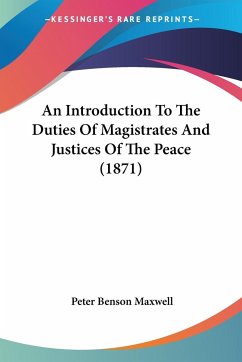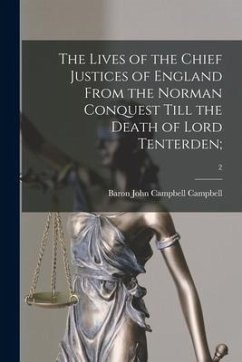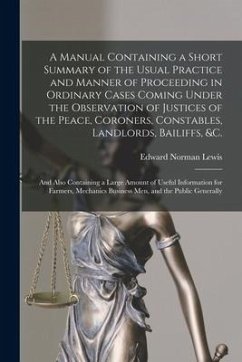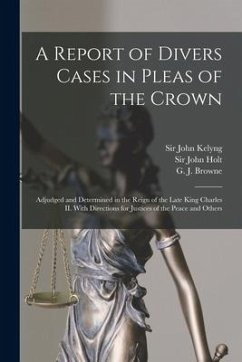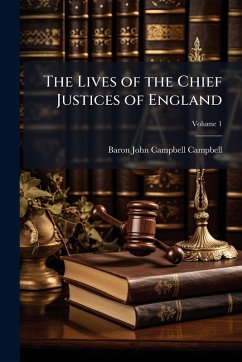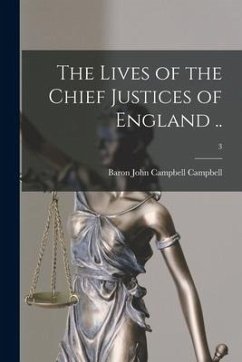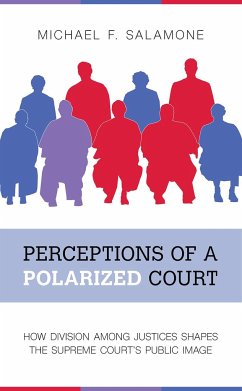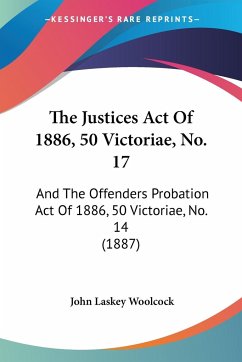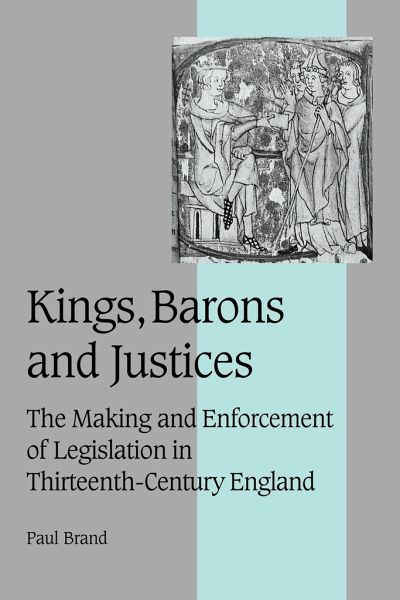
Kings, Barons and Justices
The Making and Enforcement of Legislation in Thirteenth-Century England
Herausgeber: Mckitterick, Rosamond; Carpenter, Christine
Versandkostenfrei!
Versandfertig in 1-2 Wochen
51,99 €
inkl. MwSt.
Weitere Ausgaben:

PAYBACK Punkte
26 °P sammeln!
A study of two important and related pieces of thirteenth-century English legislation.This book is a study of two important and related pieces of thirteenth-century English legislation - the Provisions of Westminster of 1259 and the Statute of Marlborough of 1267 - and is the first on any of the statutes of this period of major legislative change. The Provisions of Westminster were the first major legislation enacted in England after Magna Carta, when Henry III surrendered control of government to a baronial council with an agenda of institutional reform. The Provisions were revised and reissu...
A study of two important and related pieces of thirteenth-century English legislation.
This book is a study of two important and related pieces of thirteenth-century English legislation - the Provisions of Westminster of 1259 and the Statute of Marlborough of 1267 - and is the first on any of the statutes of this period of major legislative change. The Provisions of Westminster were the first major legislation enacted in England after Magna Carta, when Henry III surrendered control of government to a baronial council with an agenda of institutional reform. The Provisions were revised and reissued by the king in 1263, and a further revision in 1267 produced the Statute of Marlborough. Exceptionally good surviving documentation is used to follow the evolution of the individual clauses from initial suggestions for reform, through a series of drafts, to the various versions of the final texts.
Review quote:
'Paul Brand is rightly considered to be among the foremost scholars of medieval English legal history working today, and this book demonstrates why - Brand provides a meticulous and perceptive analysis of the workings of royal justice, drawing on an impressive array of published and unpublished materials - This book is not for the general reader, but anyone who seeks a better understanding of how law, legislation and juridical administration work in practice will find this a well-written, perceptive, intelligent and frequently stimulating piece of research, with important new insights, and with a focus that seeks to encompass a wide range of social, political and legal issues.' Björn Weiler, University of Wales, Aberystwyth, History
'This work is built upon a deep understanding of a very substantial, and often intractable, archive: indeed, few, if any, previous commentators have had such a command of the primary material as Brand - never before has the historical background to crucial developments in English common law been so revealingly and sensitively elucidated - richly rewarding - a fundamental examination of the medieval legislative process and a major contribution to our understanding of politics and law in thirteenth-century England.' Brian Golding, University of Southampton
Table of contents:
Introduction; Part I. Politics and the Legislative Reform of the Common Law: 1. The making of the Provisions of Westminster: the process of drafting and their political context; 2. The making of the Provisions of Westminster: the social and legal context and the evolution of the individual clauses (i); 3. The making of the Provisions of Westminster: the social and legal context and the evolution of the individual clauses (ii); 4. Enforcement of the Provisions of Westminster during the initial stages of their existence, 1259-63; 5. The revision and reissuing of the Provisions, 1263-4; 6. The revised Provisions in action, 1263-7; 7. The final revision and reissue of the Provisions of Westminster: the Statute of Marlborough of 1267; Part II. Beyond Politics: The Enforcement and Interpretation of the Statute of Marlborough in the Courts, 1267-1307: 8. Contra formam feoffamenti: the statutory action for tenants contesting liability to suit of court after 1267; 9. Other mechanisms for the enforcement of chapter nine; other reforms affecting the lord-tenant relationship; 10. Reforms in the criminal justice system; 11. Reforms in the procedures of the Royal Courts; 12. The extension of existing remedies; 13. Enforcing the accountability of socage guardians; 14. Controlling the use of distraint; 15. Remedying abuses in the operation of local courts; 16. Conclusions; Appendices; Bibliography; Index.
This book is a study of two important and related pieces of thirteenth-century English legislation - the Provisions of Westminster of 1259 and the Statute of Marlborough of 1267 - and is the first on any of the statutes of this period of major legislative change. The Provisions of Westminster were the first major legislation enacted in England after Magna Carta, when Henry III surrendered control of government to a baronial council with an agenda of institutional reform. The Provisions were revised and reissued by the king in 1263, and a further revision in 1267 produced the Statute of Marlborough. Exceptionally good surviving documentation is used to follow the evolution of the individual clauses from initial suggestions for reform, through a series of drafts, to the various versions of the final texts.
Review quote:
'Paul Brand is rightly considered to be among the foremost scholars of medieval English legal history working today, and this book demonstrates why - Brand provides a meticulous and perceptive analysis of the workings of royal justice, drawing on an impressive array of published and unpublished materials - This book is not for the general reader, but anyone who seeks a better understanding of how law, legislation and juridical administration work in practice will find this a well-written, perceptive, intelligent and frequently stimulating piece of research, with important new insights, and with a focus that seeks to encompass a wide range of social, political and legal issues.' Björn Weiler, University of Wales, Aberystwyth, History
'This work is built upon a deep understanding of a very substantial, and often intractable, archive: indeed, few, if any, previous commentators have had such a command of the primary material as Brand - never before has the historical background to crucial developments in English common law been so revealingly and sensitively elucidated - richly rewarding - a fundamental examination of the medieval legislative process and a major contribution to our understanding of politics and law in thirteenth-century England.' Brian Golding, University of Southampton
Table of contents:
Introduction; Part I. Politics and the Legislative Reform of the Common Law: 1. The making of the Provisions of Westminster: the process of drafting and their political context; 2. The making of the Provisions of Westminster: the social and legal context and the evolution of the individual clauses (i); 3. The making of the Provisions of Westminster: the social and legal context and the evolution of the individual clauses (ii); 4. Enforcement of the Provisions of Westminster during the initial stages of their existence, 1259-63; 5. The revision and reissuing of the Provisions, 1263-4; 6. The revised Provisions in action, 1263-7; 7. The final revision and reissue of the Provisions of Westminster: the Statute of Marlborough of 1267; Part II. Beyond Politics: The Enforcement and Interpretation of the Statute of Marlborough in the Courts, 1267-1307: 8. Contra formam feoffamenti: the statutory action for tenants contesting liability to suit of court after 1267; 9. Other mechanisms for the enforcement of chapter nine; other reforms affecting the lord-tenant relationship; 10. Reforms in the criminal justice system; 11. Reforms in the procedures of the Royal Courts; 12. The extension of existing remedies; 13. Enforcing the accountability of socage guardians; 14. Controlling the use of distraint; 15. Remedying abuses in the operation of local courts; 16. Conclusions; Appendices; Bibliography; Index.





